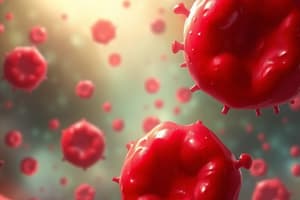Podcast
Questions and Answers
What is the role of white blood cells in the body?
What is the role of white blood cells in the body?
- Help form clots to stop bleeding
- Promote tissue growth
- Transport oxygen from the lungs to other parts of the body
- Fight infection (correct)
Which type of blood cell helps carry oxygen from the lungs to other parts of the body?
Which type of blood cell helps carry oxygen from the lungs to other parts of the body?
- Red blood cells (correct)
- Natural killer cells
- White blood cells
- Platelets
What process refers to the creation of new, mature blood cells from stem cells found in bone marrow?
What process refers to the creation of new, mature blood cells from stem cells found in bone marrow?
- Hematology
- Thrombosis
- Hematopoiesis (correct)
- Leukopenia
Which type of hematopoiesis produces the majority of adult blood cell progenitor cells?
Which type of hematopoiesis produces the majority of adult blood cell progenitor cells?
What do platelets primarily do in the body?
What do platelets primarily do in the body?
Which cells give rise to B cells, T cells, natural killer cells, and dendritic cells?
Which cells give rise to B cells, T cells, natural killer cells, and dendritic cells?
What is the main function of red blood cells in the human body?
What is the main function of red blood cells in the human body?
Which type of blood cell is responsible for clotting and preventing bleeding in case of blood vessel damage?
Which type of blood cell is responsible for clotting and preventing bleeding in case of blood vessel damage?
Where are white blood cells primarily produced in the human body?
Where are white blood cells primarily produced in the human body?
Which blood component carries hemoglobin and binds to oxygen and carbon dioxide?
Which blood component carries hemoglobin and binds to oxygen and carbon dioxide?
What is the term for the process of producing new blood cells?
What is the term for the process of producing new blood cells?
Which type of white blood cell helps protect against infections by fighting off bacteria and other foreign invaders?
Which type of white blood cell helps protect against infections by fighting off bacteria and other foreign invaders?
Why is it crucial to understand hematopoiesis for maintaining proper blood health?
Why is it crucial to understand hematopoiesis for maintaining proper blood health?
What is the primary consequence of having too few red blood cells in the body?
What is the primary consequence of having too few red blood cells in the body?
How does leukopenia affect the body's ability to fight infections?
How does leukopenia affect the body's ability to fight infections?
Which hematologic disorder raises the risk of stroke and blood clots?
Which hematologic disorder raises the risk of stroke and blood clots?
Where do mature red and white blood cells travel through after being formed?
Where do mature red and white blood cells travel through after being formed?
What is the role of platelets in the bloodstream?
What is the role of platelets in the bloodstream?
Flashcards are hidden until you start studying
Study Notes
Hematology is a branch of medicine that focuses on blood disorders, including blood cells and their formation. Blood cells play various roles in our body and can be grouped into three main types: red blood cells (erythrocytes), white blood cells (leukocytes), and platelets. Red blood cells carry oxygen from the lungs to other parts of your body. White blood cells help fight infection. Platelets form clots to stop bleeding if you get cut or injured. They also support healing by releasing chemicals that promote tissue growth.
Hematopoiesis refers to the process of creating new, mature blood cells from stem cells found inside bone marrow. This happens throughout life, although it's more active during certain periods like infancy and adolescence. There are two major forms of hematopoiesis: myeloid and lymphoid hematopoiesis. Myeloid hematopoiesis produces the majority of adult blood cell progenitor cells. Lymphoid hematopoietic cells give rise to B cells, T cells, natural killer cells, and dendritic cells. These cells function together to protect the body against disease and infection.
In summary, hematology deals with blood cells and their production through hematopoiesis. It encompasses the study of diseases related to blood and its components, such as anemia, leukopenia, thrombosis, hemorrhage, etc. Understanding these processes helps doctors diagnose and treat diseases linked to abnormalities in blood cell counts and characteristics.
Studying That Suits You
Use AI to generate personalized quizzes and flashcards to suit your learning preferences.



